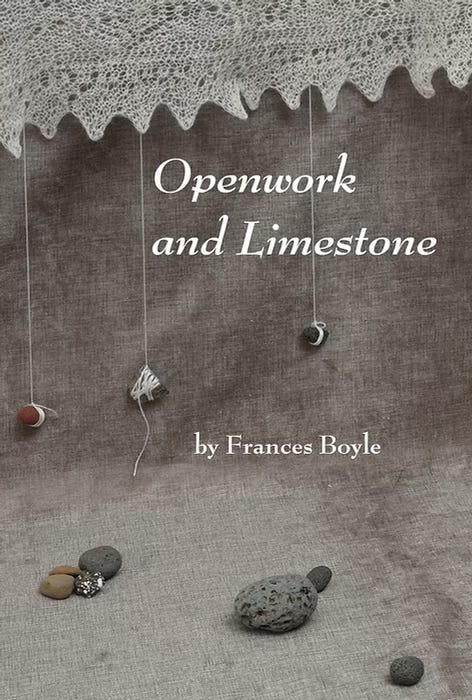#19: An Interview with Frances Boyle
"Writing, when it flows, feels like letting go of tension, bringing things into a gentle focus, a focus that is often skewed and through a warped lens."
Welcome to Archipel, an ongoing dialogue between me (Cara Waterfall) and other poets and creatives of all kinds, celebrating the ways we connect through mentorship, community and transitions.If you are interested in participating, please send me an email by replying to this newsletter or click here.
Archipel was also inspired by my very first poetry mentor, my father. When you purchase a subscription to this newsletter, you are paying into a scholarship fund in his name, which will support emerging poets.
I’m proud to tell you that the fund currently has $2, 313.32 USD! And we will be raising funds until September 1, 2025, which means we have another seven months before we award this fund to a deserving, emerging poet.
To learn more about The Donald E. Waterfall Scholarship Fund, click here.
Thank you for reading!
Today's interview is with Frances Boyle, an acclaimed Ottawa-based writer whose creative work spans fairy-tale retellings, speculative fiction and lyrical poetry. From legal briefs to literary pursuits, Frances' writing journey bridges her prairie origins with her Ottawa present.
Immersed in the Canadian writing community, Frances serves on the editorial team for Arc Poetry Magazine, writes reviews for various literary journals and acts as Secretary of The League of Canadian Poets. Her work has appeared in literary magazines throughout North America, and she maintains an active presence in Ottawa's vibrant poetry scene through its poetry festival, VERSe Ottawa, and the Ruby Tuesday weekly writing group, which she helped found in 2006.
Her most recent book, Openwork and Limestone (Frontenac House, 2022), is her third poetry collection, in which present-day women's experiences are explored through the lens of ancient Celtic mythology.
She is the author of two other poetry books, This White Nest (Quattro Books, 2019) and Light-carved Passages (Buschek Books, 2014, reissued by Doubleback Books, 2024), and her novella Tower (Fish Gotta Swim Editions, 2018) offers a modern reimagining of Rapunzel.
Her short story collection, Seeking Shade (The Porcupine's Quill, 2020) was a finalist for the Danuta Gleed Award and won the Miramichi Reader Very Best! Award.
Follow Frances’ literary journey on Twitter, Instagram, Bluesky and Threads.
Who are you and how do you express your creativity or describe your art?
Ah, the existential question of who I am!
Some of the facets that make up Frances are: mother, daughter, spouse, dog servant. Transplanted prairie girl. Former lawyer, lifelong writer. Daydreamer with a practical side.
I describe my art in broad terms as poetry, sometime confessional, sometimes narrative sometimes surreal, often lyrical; and, fiction, both short stories and long form, that is character-driven which usually has a fairly realistic setting with some forays into the speculative and the dreamy.
What keeps you coming back to creative work? Why is it worth doing?
I keep coming back because I can’t help myself. Writing is my way of seeing the world, feeling out ideas and emotions in a way that lets me evade my rational, left-brained orientation. Writing is something I do to try and help me figure things out, even though the subjects may be very far from my day-to-day life.
Writing, when it flows, feels like letting go of tension, bringing things into a gentle focus, a focus that is often skewed and through a warped lens. It’s worth doing in the hope that the work itself is worthwhile, which is not readily defined and which one can never really know in the moment. For me, it is worth doing for its own sake and for the possibility that someone who reads my work might be moved or changed by what I’ve created.
What are your biggest challenges when it comes to maintaining a steady creative practice, and how have you overcome them?
I can’t say that I’ve overcome my challenges, but rather that I continue to grapple with them. Making writing time a priority is probably my biggest challenge, along with a considerable amount of distractibility. My instinct at the start of any given day is to “take care of a few things first”, be they emails or crossing things off my to-do list. My rationale is that I’ll then be able to settle into creative work without tasks hanging over me. Instead, the tasks are capable of growing to fill the best part of a day, so that I am weary when I finally set to writing, and can become unproductive and avoidant. Even my journal can keep me from getting down to writing (though other times it is where I work out thorny problems, try out new ideas, develop characters’ backstory, etc.).
One thing that helps me overcome this distraction is having my writing group, the Ruby Tuesday group, who have been meeting together every week for over 18 years. Our sessions always begin with 15 minutes of writing which is often the source of my poems, the “compost heap” my writing can grow upon. And the impetus to bring work to a writing group for critiquing frequently spurs me to put in the time to develop a rough draft into a more fulsome version approaching a poem.
Why does mentorship/ community support matter?
Writing can be a very isolating experience, because it is usually a solitary pursuit. When you’re isolated, it’s easy to lose perspective, thinking that what you’re working on is the greatest thing ever or (much more likely, at least for me and most of the women writers I know) that you’ve written the worst possible garbage, that every rejection is a personal blow, that you should give up this ridiculous notion of being a writer, and so on in a downward spiral.
Community is about lifting one another up, about celebrating successes and recognizing rejections as disappointment that are just part of the process. A good mentor can push you in a constructive and supportive way to make your writing stronger, sharing their skills and experience in a collaborative way. Being in community can provide some of the same support but may also help nourish a writer’s emotional life.
Do you have a mentor? If yes, who is your mentor?
I don’t have a single mentor; several previous mentors have gone on to become friends but there is no one who’s remained in that capacity for a long period of time. Instead, I’ve been blessed to have had a number of incredible mentors, both in formal arrangements through writing programs, and informally. I won’t attempt to name them all for fear of leaving someone out, but key mentors for fiction were Isabel Huggan and the late Janet Lunn; for poetry, Barry Dempster, Miller Adams and Susan Gillis each provided vital guidance and support at different stages of my writing life.
Are there other support structures or community that have helped you?
In addition to these individual mentors, writing groups have been my lifelines, especially the women of the Ruby Tuesday group, who have become like family. Volunteer commitments, like my years as part of the editorial team at Arc Poetry Magazine, and my current work with VERSe Ottawa, which runs our city’s international poetry festival, and with The League of Canadian Poets are also sources of community;
I benefit to a far greater extent than what I give to these groups -- in making connections with fellow writers, honing my craft, learning about new approaches and working with incredible teams.
Attending readings, being part of an audience, reading at open mics, is another way I found useful to foster community and become exposed to what both established and fledgling writers are exploring.
I live in Ottawa which has a thriving poetry scene (although several series dwindled and disappeared over the early years of the pandemic) but even people who don’t have ready access to in person events can still make connections through online readings, short workshops, and co-writing sprints.
How did you find your mentor? (or support structure/community)
I am fortunate enough to have had the resources to enrol in writing programs over the years, including Sage Hill Writing Experience, the Banff Centre’s Wired Writing Program and the Humber School for Writers, as well as shorter residential and community-based courses and online workshops. Word of mouth and getting to know people at workshops or readings has always been how I ended up in my writing groups and some of the other editorial / organizational gigs I’ve been lucky enough to have been offered.
One connection always tends to spark further connections.
(Interview answers received via email February 6, 2025.)







I like this "gentle focus" quote and the recognition of a "warped lens." Thank you, Frances Boyle, and Cara, for the interview.